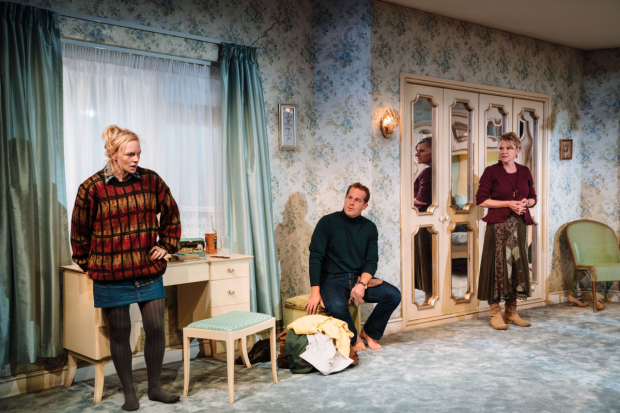
© Helen Murray
Memory is a slippery thing and, in Shelagh Stephenson's Olivier Award-winning play, here revived for its 25th anniversary, its absence can be as cruel as its recollection.
Three sisters gather in their late mother's home in the middle of winter to say their final farewells. They all have psychological crosses to bear and, as whisky is swigged and joints puffed, long-held grudges and secrets soon come tumbling out as they confront the past and the passing of time.
The action takes place entirely in the mother's bedroom, and her presence becomes more than spiritual when she starts communing with one of her daughters, Mary (Laura Rogers), a doctor who is desperate to have children with her married lover.
The youngest, Catherine (Caroline Main), is having men trouble of her own, having slept with 78 of them and still waiting for one who will stick around. Meanwhile big sister Teresa (Lucy Black) is fed up after years of carrying the can of their mother's Alzheimer's care.
They bicker at speed, their Yorkshire dialects mingling to become a trio of disharmony. As with many siblings, they have particular roles and ways of communicating that can be alienating to their significant others – here represented by Mike (Adam James), the aforementioned married lover, and Frank (Kulvinder Ghir), long-suffering husband of Teresa.
There are laughs aplenty – Stephenson's writing puts one in mind of Victoria Wood -–and played out on Anna Reid's naturalistic bedroom set, all frills and flowers, it has a decidedly sitcom feel. But the mood takes a significantly darker turn in the latter stages when one sister must face up to a particularly painful event from years before.
It's a long evening, and Alice Hamilton's production at times feels like it's applying brakes when it should be cruising. I also felt the manifestation of the mother's ghost sits rather at odds with the naturalistic approach.
But there are very few complaints when it comes to the performances. The casting is pretty much note-perfect, and the chemistry between the sisters is delightful. From the operatic meltdowns of Catherine to the dawning realisation of Teresa that she has married her father, there is much to enjoy on the comedy front, while the pain that underscores Mary's often barbed pronouncements is deeply poignant. And they are strongly supported by James and Ghir, who share a lovely moment of physical comedy in the latter stages.
In some sense it seems a strange play for the times, feeling more like a slice of nostalgia. But the issues it explores are timeless – and its central question, regarding the ownership of memory, deeply provocative. Stephenson's voice is undoubtedly one that merits reappraisal.












